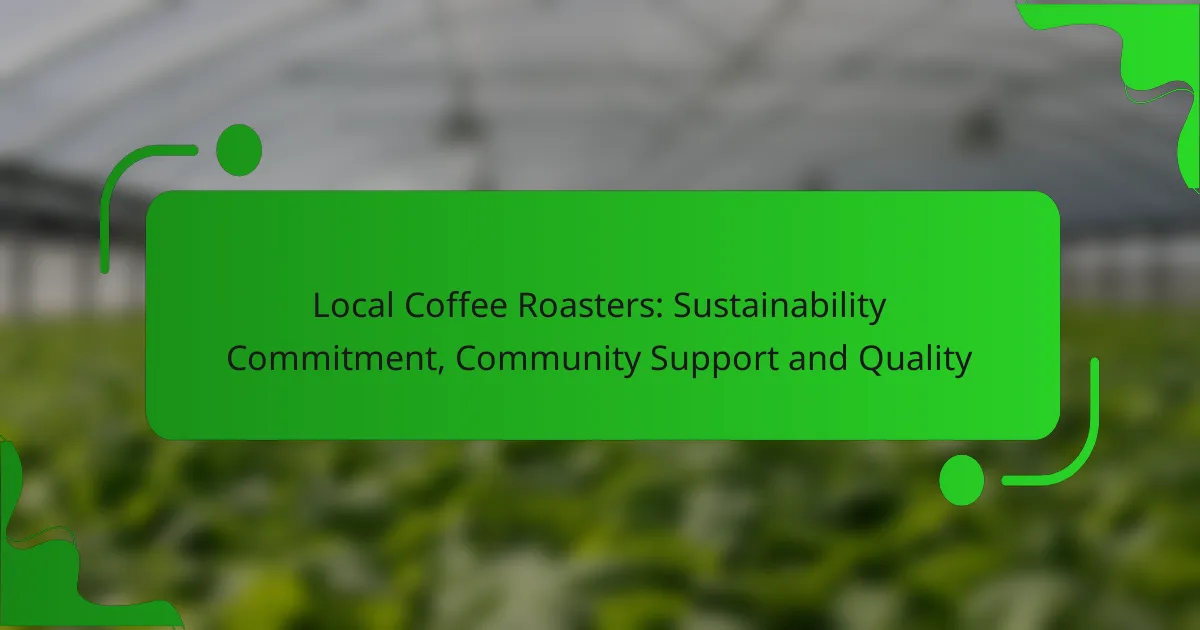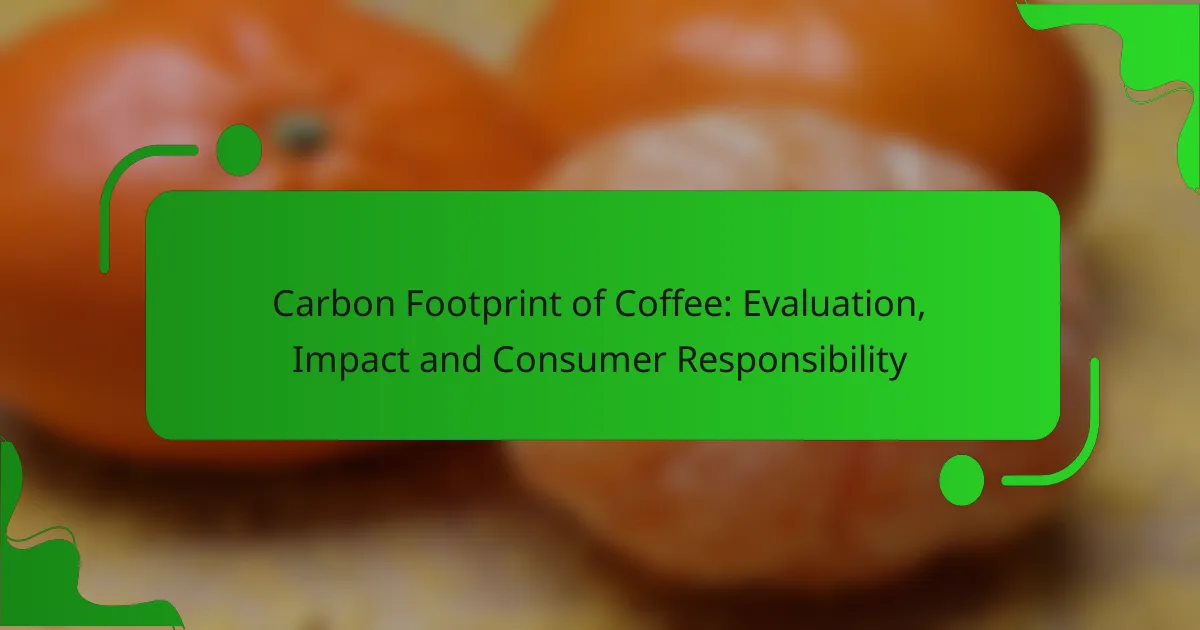Fair Trade Coffee is a movement aimed at providing equitable compensation to coffee farmers, enhancing their livelihoods and fostering community development. By promoting sustainable farming practices, it not only benefits the environment but also influences consumer choices towards more ethical purchasing. As consumers become more aware of the impact of their choices, Fair Trade Coffee stands out as a responsible option that aligns with their values.

How does Fair Trade Coffee benefit local communities?
Fair Trade Coffee benefits local communities by ensuring that farmers receive fair compensation, which helps improve their quality of life and supports community development. This approach fosters economic stability and encourages sustainable practices that benefit both the environment and the people involved in coffee production.
Improved income for farmers
Fair Trade Coffee guarantees farmers a minimum price for their products, which is often higher than the market rate. This improved income allows farmers to invest in their families, education, and healthcare, leading to a better standard of living. Many farmers report increases in earnings by 20-30% compared to conventional pricing.
Additionally, Fair Trade premiums provide extra funds that can be used for community projects, further enhancing the economic benefits for farmers and their families.
Investment in community projects
Fair Trade initiatives often allocate a portion of the profits to community projects such as schools, healthcare facilities, and infrastructure improvements. These investments are crucial for enhancing the overall quality of life in coffee-growing regions. For example, communities may use these funds to build schools or improve access to clean water.
Farmers typically participate in decision-making processes regarding how these funds are spent, ensuring that the projects align with the community’s needs and priorities.
Promotion of sustainable farming practices
Fair Trade Coffee encourages sustainable farming practices that protect the environment and promote biodiversity. Farmers are trained in organic farming techniques, reducing reliance on harmful pesticides and fertilizers. This not only benefits the ecosystem but also enhances the quality of the coffee produced.
By adopting these practices, farmers can often command higher prices for their organic coffee, further boosting their income while contributing to environmental conservation efforts.

What are the environmental benefits of Fair Trade Coffee?
Fair Trade Coffee offers significant environmental benefits by promoting sustainable farming practices that minimize harm to ecosystems. These practices not only reduce pollution but also enhance the health of the surrounding environment.
Reduced chemical usage
Fair Trade Coffee encourages farmers to limit the use of synthetic pesticides and fertilizers, opting instead for organic alternatives. This reduction in chemical usage leads to less soil and water contamination, which is crucial for maintaining local ecosystems.
By adhering to Fair Trade standards, coffee producers often implement integrated pest management techniques that rely on natural predators and crop rotation. This approach not only protects the environment but can also improve the quality of the coffee produced.
Encouragement of biodiversity
Fair Trade Coffee promotes agricultural practices that support biodiversity, such as shade-grown coffee cultivation. This method allows various plant species to thrive alongside coffee plants, creating habitats for wildlife and contributing to healthier ecosystems.
By fostering diverse ecosystems, Fair Trade farming helps to protect against pests and diseases, reducing the need for chemical interventions. This biodiversity is essential for resilience against climate change and ensures the long-term sustainability of coffee production.

How does Fair Trade Coffee impact consumer choices?
Fair Trade Coffee significantly influences consumer choices by promoting ethical purchasing decisions. Consumers increasingly seek products that align with their values, leading to a preference for coffee that supports fair labor practices and sustainable farming.
Increased awareness of ethical consumption
The rise of Fair Trade Coffee has heightened awareness around ethical consumption. Consumers are now more informed about the origins of their coffee, including the conditions under which it is produced and the impact on farmers’ livelihoods.
This awareness often translates into a willingness to pay a premium for Fair Trade products, as many believe their purchases can contribute to social and environmental justice. As a result, brands that prioritize ethical sourcing often gain a competitive edge in the market.
Support for local businesses
Choosing Fair Trade Coffee often means supporting local farmers and cooperatives rather than large corporations. This support can help strengthen local economies, as farmers receive fair compensation for their products, enabling them to invest in their communities.
Moreover, consumers can foster relationships with local businesses that sell Fair Trade Coffee, creating a sense of community and shared values. This connection can enhance customer loyalty and encourage more sustainable practices within the local economy.

What certifications are associated with Fair Trade Coffee?
Fair Trade Coffee is often certified by various organizations that ensure ethical sourcing and sustainable practices. The most recognized certifications include Fair Trade Certified and Rainforest Alliance Certified, each with specific criteria that promote social and environmental responsibility.
Fair Trade Certified
The Fair Trade Certified label guarantees that coffee producers receive fair compensation for their products, promoting equitable trading relationships. This certification focuses on improving the livelihoods of farmers and their communities by ensuring minimum price standards and additional premiums for community development.
To qualify for Fair Trade Certified status, producers must adhere to strict guidelines regarding labor practices, environmental sustainability, and community investment. This often includes providing safe working conditions, prohibiting child labor, and encouraging organic farming methods.
Rainforest Alliance Certified
The Rainforest Alliance Certified label emphasizes environmental conservation and sustainable farming practices. This certification aims to protect ecosystems while supporting farmers in their efforts to produce coffee responsibly.
Producers must meet criteria that include maintaining biodiversity, conserving water resources, and implementing integrated pest management. This certification not only benefits the environment but also enhances the quality of the coffee, appealing to consumers who prioritize sustainability.

What are the key criteria for Fair Trade certification?
Fair Trade certification is based on several key criteria that ensure ethical practices in coffee production. These criteria focus on fair pricing, sustainable farming methods, and direct relationships between producers and buyers.
Minimum price guarantee
A minimum price guarantee is a fundamental aspect of Fair Trade certification, ensuring that coffee farmers receive a stable income regardless of market fluctuations. This price is often set above the prevailing market rate to protect producers from volatile pricing.
For instance, the Fair Trade minimum price for coffee can range around $1.40 to $1.70 per pound, depending on the quality and type of coffee. This guarantee helps farmers cover their production costs and invest in their communities.
Direct trade relationships
Direct trade relationships are essential in Fair Trade, promoting transparency and fair compensation for farmers. By connecting producers directly with buyers, these relationships eliminate middlemen, allowing farmers to receive a larger share of the profits.
For example, a coffee roaster might establish a direct partnership with a cooperative of farmers, ensuring that the farmers receive a fair price for their beans while the roaster can offer high-quality, ethically sourced coffee to consumers. This approach fosters trust and encourages sustainable practices in coffee production.

How can consumers find Fair Trade Coffee in their area?
Consumers can find Fair Trade Coffee by checking local listings, visiting specialty shops, or exploring online platforms. Many retailers now highlight Fair Trade certifications, making it easier to identify these products.
Local coffee shops offering Fair Trade options
Many local coffee shops prioritize sustainability and ethical sourcing by offering Fair Trade options. To find these shops, look for those that display Fair Trade certification logos or inquire with baristas about their sourcing practices.
Some popular chains and independent cafés often feature Fair Trade coffees on their menus. You can also use apps or websites that list cafés committed to Fair Trade practices in your area.
Online retailers specializing in Fair Trade products
Numerous online retailers focus on Fair Trade products, providing a convenient way to purchase ethically sourced coffee. Websites like Fair Trade Certified, Equal Exchange, and Amazon offer a variety of Fair Trade coffee brands.
When shopping online, check for certifications and read product descriptions to ensure the coffee meets Fair Trade standards. Look for retailers that provide detailed information about their sourcing practices and the impact of your purchase.

What are the emerging trends in Fair Trade Coffee?
Emerging trends in Fair Trade coffee include increased consumer awareness, the rise of direct trade practices, and a growing emphasis on sustainability. These trends reflect a shift towards more ethical sourcing and environmental responsibility in the coffee industry.
Increased Consumer Awareness
Consumers are becoming more informed about the origins of their coffee and the impact of their purchases. This awareness drives demand for Fair Trade certified products, as buyers seek to support ethical practices that benefit farmers and their communities.
Brands are responding by highlighting their Fair Trade certifications and sharing stories of the farmers behind their products. This transparency helps consumers make informed choices that align with their values.
Rise of Direct Trade Practices
Direct trade is gaining popularity as an alternative to traditional Fair Trade models. In direct trade, roasters establish direct relationships with coffee producers, often resulting in higher prices for farmers and better quality beans for consumers.
This trend allows for more flexibility in pricing and quality control, as roasters can negotiate terms directly with producers. It also fosters a sense of community and collaboration between farmers and roasters.
Emphasis on Sustainability
Sustainability is becoming a key focus in the Fair Trade coffee movement. Many consumers are looking for products that not only support fair wages but also promote environmentally friendly practices.
As a result, Fair Trade certifications are increasingly incorporating sustainability criteria, such as organic farming practices and biodiversity conservation. This shift encourages producers to adopt methods that protect the environment while still providing fair compensation.



